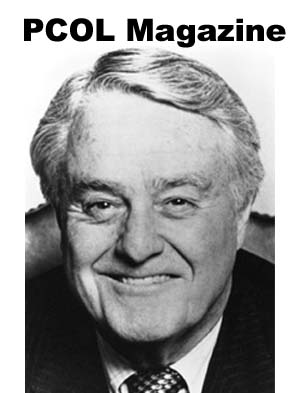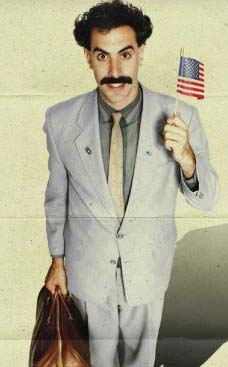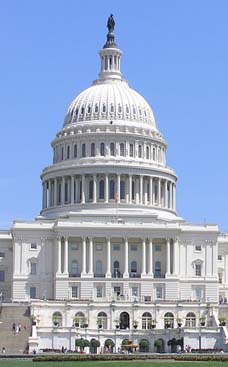
In the very early days of the Peace Corps, the Secretary of State was Dean Rusk, and he epitomized the essence of the Peace Corps, so far as foreign policy is concerned, in a sentence we have been using over the years, "The Peace Corps will make its greatest contribution to foreign policy by not being a part of foreign policy." So technically, the Peace Corps should not be looked on as an instrument of U.S. foreign policy. The only time it could ever become a negative factor in U.S. foreign policy would be at a time if, and when, that U.S. foreign policy became totally militaristic. If our foreign policy were ever to sink to that level, then the Peace Corps would be a thorn in the side of that policy.
An Interview with Sargent Shriver in 1986
Deals and Imperfections
An Interview with Sargent Shriver
In 1961, only weeks after his inauguration, President John F. Kennedy established the Peace Corps. At the helm of the new and somewhat undefined agency, Kennedy placed Sargent Shriver.
Within six months, the relatively inexperienced Shriver had created a fully functional government agency. By autumn 1961, the first Peace Corps volunteers were on their way to the developing world to offer what they could to improve living standards in impoverished villages. But as support for the program has grown, so has the controversy surrounding the Peace Corps. On the occasion of the Peace Corps' 25th Anniversary, Shriver talked with the Multinational Monitor about the formation of the Peace Corps and the role it has played in development, public relations, and politics.
Multinational Monitor: What was the economic development philosophy behind the Peace Corps?
Sargent Shriver: What we had was a practical approach to economic development. When we came down to start the Peace Corps there were some people who ridiculed the idea, mega-economists-people like Walt Rostow. They were really at a different level of intellectual concern and economic analysis. In their concept the Agency for International Development (AID) would control the total overseas economic program in the United States.
The interesting thing to me is that back in 1961 we were really looked upon as something almost ridiculous by the gurus of economic development and our approach was brushed aside as irrelevant. But AID is now more like the Peace Corps than it is like AID used to be. AID's money, instead of going into huge electrical power projects, is now going out in the boondocks and they're finding the Peace Corps is already there. Twenty-five years of the Peace Corps has changed the outlook of at least some economic development experts.
Monitor: Where does the Peace Corps fit into U.S. foreign policy, both historically and today?
Shriver: In the very early days of the Peace Corps, the Secretary of State was Dean Rusk, and he epitomized the essence of the Peace Corps, so far as foreign policy is concerned, in a sentence we have been using over the years, "The Peace Corps will make its greatest contribution to foreign policy by not being a part of foreign policy." So technically, the Peace Corps should not be looked on as an instrument of U.S. foreign policy.
The only time it could ever become a negative factor in U.S. foreign policy would be at a time if, and when, that U.S. foreign policy became totally militaristic. If our foreign policy were ever to sink to that level, then the Peace Corps would be a thorn in the side of that policy.
Monitor: The Peace Corps director gave a speech a few years ago that said that Peace Corps programs could help to expand markets for American companies abroad. Do you agree with this?
Shriver: Well that's certainly a byproduct of the Peace Corps. The development of economic independence ultimately leads to development of your market. There's no question about that. That was the great thing that Franklin Roosevelt did. The New Deal transformed this country because it transferred purchasing power to people who didn't have it. It made customers out of people who were on a bread line.
Monitor: But in the Third World, at its current stage of development, in order to be customers for the kind of goods that American business is selling, people have to have dollars. In order to have dollars, cash crops must be produced and often this production displaces food crops. Is that the direction the Peace Corps is heading?
Shriver: That's a bad direction. I don't think the Peace Corps should be encouraging cash crops. Nor do I think its the only way to have dollars, or to have a viable economic situation in a country. I think that's corrupt and caters exclusively to our capitalist system. It doesn't benefit, in my judgment, the people of the countries that are caught up in that process.
Monitor: Do you think that Peace Corps volunteers have been antithetical to the interests of U.S. multinationals?
Shriver: No. I wish the Peace Corps had been so significantly successful that it would be able to offer some kind of competition to multinationals, but I don't think the Peace Corps has reached that point anywhere.
Monitor: Have there been instances when Peace Corps activities have been creating a political movement in one direction which is contrary to the direction that the State Department, the Pentagon and the CIA are pushing in?
Shriver: Well, I would not say that the Peace Corps was creating a political movement because we don't do that. But as a result of Peace Corps education, as a result of Peace Corps attitudes, and as a result of Peace Corps compassion, people change. We don't get into politics or economics, but the Peace Corps can teach people to do those things by themselves.
Monitor: When has the Peace Corps encouraged people in this manner so that they have organized against the United States?
Shriver: The Philippines is a good example. We've had 8,000 volunteers or more in the Philippines. The Peace Corps in that country was a significant factor in the development of the Aquino movement and you can go other places and find the same thing.
Monitor: Does this undermine U.S. foreign policy?
Shriver: The kind of foreign policy that the military and the CIA conduct on behalf of the United States is not the kind of foreign policy that the Peace Corps represents. Fm not trying to condemn what the CIA does or what the military does, Pm trying to say it is different from what the Peace Corps does.
It could be antithetical. It depends upon the actual situation in a given country. When [General Augusto] Pinochet came into power a lot of Peace Corps volunteers were in Chile and they started protesting Pinochet and writing letters to newspapers. I was criticized in Washington for the actions of these volunteers. My response was that we should rejoice that we are the only country in the world that had the vision to send abroad people who are not under government control. Instead, they are independent free-standing human beings. I maintain that they are the greatest advertisement for the American system of government that there is in the world, they are worth a thousand Coca-Cola signs. There is no better advertisement for what this country stands for than an individual Peace Corps volunteer walking down the street unarmed, wearing the same clothes that the people do, eating the same food, living the same life, and being there as an independent free-standing person who believes in democracy and who is compassionate to his fellow man. That's what we're supposed to produce here. We're not here to produce bombs. We're producing a certain kind of human being. When we started the Peace Corps no country had such an activity abroad, no other country had the nerve.
Monitor: What is the net effect of that in South East Asia in the 1960s or Central America today, where on the one hand the United States is pouring in hundreds of thousands of troops, creating a massive military operation, and in the neighboring countries you have Americans serving as walking advertisements for the American system?
Shriver: I think there's a schizophrenia in the American society. But I'm on the side of the people that started the United States, I think people like Washington and Jefferson, and for that matter all the other heroes of the American revolution were revolting against exactly what our government has become. When a country gets to a certain position in terms of power and money, there are people whose objective in life is to protect that power and that money. They become a force for modifying the original "revolutionary" purposes of this country. One of the great sentences in the Declaration of Independence is the last sentence, "We commit our lives, our fortunes, and our sacred honor." Who in the United States is willing to commit their fortunes, lets forget the sacred honor, lets forget the life. I bet I can take every one of the presidents of the five hundred biggest corporations in America and not find one that would put his fortune on the line.
Charles Carroll, who signed the Declaration of Independence, was the richest man in Maryland, one of the richest people in the United States, and he put his name on the bottom of that thing. George Washington was a rich man and he put his life, his honor, and his fortune on that thing. I don't know how many people signed the Declaration but I'll bet we'd have a hell of a hard time getting a hundred people to sign the Declaration of Independence today if you underlined the word fortune. How many guys like Carl Icahn or the Bass Brothers would put their fortunes behind an effort to extend the principles of the American Revolution to Mexico City? There's fifteen million people in Mexico City right now. It has the potential to explode, but how many people in the United States would be willing to supply their fortunes to take care of that problem?
Now I personally would rather the United States put a $100 million of Peace Corps volunteers in [a country] than $100 million of tanks. I think it would be better for the United States in the short and in the long run, but that requires a hell of a lot of confidence. I have huge confidence in the transformative power of people and in their capacity to represent what we are really all about. In many countries around the world, especially in Latin America, the major U.S. presence is the military. The second big presence we have had in those countries is an economic presence through multinationals. But the multinational economic presence is assisted by a military presence, and the political presence does not drastically differ from the economic presence. In other words, State Department people, our ambassadors, to a huge extent have been in tune with economic development abroad as represented primarily by major U.S. corporate efforts in those countries.
Our objective has been to meld economic development with military security. They then work together to exploit or develop the country. But this method of developing a country only brings into being a middle class. I'm not against that, but historically that has included only a very small number of people.
The Peace Corps has not been in that business. The Peace Corps was working with a different group of people, we were working with the campesinos in Latin America, we were working with the poor. The middle class were not the recipients of Peace Corps assistance. In fact, they didn't want or need Peace Corps assistance. We were working with a group of people who were not part of the structure in that country at all. We were regarded by the businesses and the diplomatic and intelligence community as peripheral to the main show. And we are still looked upon in that way.
Monitor: Doesn't it make you uncomfortable that people representing other elements or currents of the government like the Pentagon or CIA feel that the work of the Peace Corps is actually helping to maintain the status quo in these countries?
Shriver: That doesn't concern me because if, through the Peace Corps or through any other educational effort, we are able to raise the humanity, the quality of human life for those billions of people who are outside of the mainstream, if we are able to raise that, these questions that you and I are talking about will be resolved. Not by you or me or the Pentagon or the CIA but by historical forces.
Monitor: I guess the question is what is really the most effective way to raise the quality of human life. The Peace Corps is often seen as kind of a safety valve to let off a little steam at a time when the most effective way to change the quality of human life would be to have some real momentum for basic grass roots change which in most cases would clash with the interests of the U.S. government. Do you think the Peace Corps serves as a safety valve?
Shriver: It cannot help but serve a safety valve function as it develops its own strength. That's an interim situation. Let me change the subject and talk about something that is analogous and that was what we called the war against poverty here in the United States. In the war against poverty we started something called community action and we invited poor people in the United States to serve on a board-a community action board-along with representatives of local government and representatives of the private sector. Community action agencies, you could argue, were a safety valve. But there are six members of Congress who got their start in life through community action. The mayor of Washington, Marion Barry got his start in community action. Andy Young got his start in community action. I could give you a hundred names like that. There are also literally thousands of human beings who now have a reasonable human existence in this country because of community action. Now community action could have been seen as a safety valve, a co-option of the poor. The same argument could also be made against the Peace Corps, that in fact it acts as a safety valve. If community action stops short of empowering all people to participate in the process, then one could say that it ended up by being nothing but a co-opting safety valve operation. If, on the other hand, it continues to empower and ennoble the people who are outside the mainstream, then it's not really a safety valve because it can transform society. The question then remains, will it be financed by this country to the extent that it will transform the society?
Monitor: How successful has the Peace Corps been in transforming society in the Third World?
Shriver: The Peace Corps' effort has not been negligible. Am I satisfied with the pace? No, I sure as hell am not. I think that what we've been doing out there and what we've done in community action is to plant seeds and you and I don't know what the ultimate result will be. But I know that the seeds we're planting are the right seeds and we're planting them in the right places. Whether we're planting enough, whether we have enough time, whether we who are planting those seeds will be able to overcome those who are using the big bucks and the big bombs and the power politics, who knows?


















